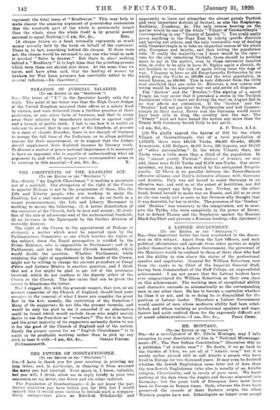THE FIRSTFRUITS OF THE ENABLING ACT. [To THE EDITOR OF
THE "SPECTATOR."]
Sia,—Surely " An English Churchman" is making a mountain out of a molehill. The abrogation of the right of the Crown to appoint Bishops is not in the programme of those, like tho Life and Liberty people, who are working to make the Enabling Act a real instrument of reform. As set forth in a recent pronouncement, the Life and Liberty Movement is working to secure the following : (1) A better distribution of the resources of the Church, both in men and money; (2) aboli- tion of the sale of advowsons and of the ecclesiastical freehold; (3) an increase in the Episcopate by the further division of unwieldy dioceses.
The right of the Crown to the appointment of Bishops is obviously a matter which must be reported upon by the Parliamentary Committee as one which touches the rights of the subject, since the Royal prerogative is wielded by the Prime Minister, who is responsible to Parliament; and it is Parliament, and not the National Church Assembly, which would decide the question. Whether Parliament, while retaining the right of appointment in the hands of the Crown, might not be willing to change the ancient procedure of Conge trelire and Letters Missive is another question, and I think that not a few might be glad to get rid of the pretences Involved, which do not conduce to the dignity either of the Crown or the Church. The less cause that can be given the enemy to blaspheme the better.
May I suggest, Sir, with the greatest respect, that you, as an earnest supporter of the Church of England, should lend your energies to the removal of what I know you consider the great flaw in the Act; namely, the restriction of the franchise ? Many of its supporters do not like the present formula, and would be only too glad to see it amended if an alternative could be found which would exclude those who might merely desire to use the franchise as " wreckers." The Act is in force, and the great majority of its supporters earnestly desire to use It for the good of the Church of England and of the nation. Surely the proper course for an "English Churchman" is to assist in its profitable working rather than to pick up any


































 Previous page
Previous page